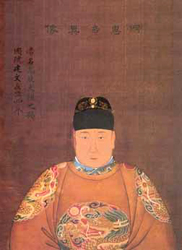
Back Jianwen Afrikaans الامبراطور جيانوين Arabic الامبراطور جيانوين ARZ جیانون AZB Jianwen Catalan Gióng-ùng Huòng-dá̤ CDO Ťien-wen Czech Jianwen-kejseren Danish Jianwen German Imperiestro Ĝjianveno Esperanto
| Jianwen Emperor 建文帝 | |||||||||||||||||
|---|---|---|---|---|---|---|---|---|---|---|---|---|---|---|---|---|---|
 Posthumous illustration of the Jianwen Emperor, Qing dynasty | |||||||||||||||||
| Emperor of the Ming dynasty | |||||||||||||||||
| Reign | 30 June 1398 – 13 July 1402 | ||||||||||||||||
| Enthronement | 30 June 1398 | ||||||||||||||||
| Predecessor | Hongwu Emperor | ||||||||||||||||
| Successor | Yongle Emperor | ||||||||||||||||
| Imperial Grandson-heir of the Ming dynasty | |||||||||||||||||
| Tenure | 1392–1398 | ||||||||||||||||
| Successor | Imperial Grandson-heir Zhu Zhanji | ||||||||||||||||
| Born | 5 December 1377 Hongwu 10, 5th day of the 11th month (洪武十年十一月初五日) Yingtian Prefecture, Ming dynasty (present-day Nanjing, Jiangsu Province, China) | ||||||||||||||||
| Died | Unknown[a] | ||||||||||||||||
| Spouse | |||||||||||||||||
| Issue |
| ||||||||||||||||
| |||||||||||||||||
| House | Zhu | ||||||||||||||||
| Dynasty | Ming | ||||||||||||||||
| Father | Zhu Biao | ||||||||||||||||
| Mother | Lady Lü | ||||||||||||||||
| Jianwen Emperor | |||||||
|---|---|---|---|---|---|---|---|
| Chinese | 建文帝 | ||||||
| Literal meaning | "Establishing Civility" (era name) Emperor | ||||||
| |||||||
The Jianwen Emperor (5 December 1377 – ?), personal name Zhu Yunwen (朱允炆), also known by his temple name as the Emperor Huizong of Ming (明惠宗) and by his posthumous name as the Emperor Hui of Ming (明惠帝), was the second emperor of the Ming dynasty, reigned from 1398 to 1402. Zhu Yunwen's father was Zhu Biao, the eldest son and crown prince of the Hongwu Emperor, the founder of the Ming dynasty. Zhu Biao died at the age of 37 in 1392, after which the Hongwu Emperor named Zhu Yunwen as his successor. He ascended the throne after the Hongwu Emperor's death in June 1398.
As emperor, he surrounded himself with Confucian-educated officials who immediately began revising Hongwu's reforms. However, the most significant change was the attempt to limit or eliminate the princes, who were the sons of the Hongwu Emperor and had been the main support of the previous government. Fearing the potential power of his uncles, the Jianwen Emperor attempted to restrict their influence. One of the most dangerous uncles was Zhu Di, Prince of Yan, who was put in charge of the Beijing region and was responsible for guarding the border with the Mongols. When the emperor ordered the imprisonment of his uncle's followers, Zhu Di plotted against him. In 1399, Zhu Di rebelled under the pretext of protecting the emperor from corrupt court officials. This sparked a civil war known as the Jingnan campaign, which aimed to eliminate disorder. In 1402, Zhu Di captured the capital of Nanjing and the imperial palace was burned to the ground. It is believed that the emperor, along with his empress, mother, and eldest son, perished in the fire. However, their bodies were never found, leading to rumors of the emperor's survival and refuge in a Buddhist monastery.
After conquering Nanjing, Zhu Di ascended to the throne as the Yongle Emperor. He abolished the reforms implemented by the Jianwen Emperor and declared his predecessor illegitimate—thus, he did not grant him a temple or posthumous name and abolished the era of Jianwen, extending the era of Hongwu from 1398 to 1402.
Cite error: There are <ref group=lower-alpha> tags or {{efn}} templates on this page, but the references will not show without a {{reflist|group=lower-alpha}} template or {{notelist}} template (see the help page).
© MMXXIII Rich X Search. We shall prevail. All rights reserved. Rich X Search